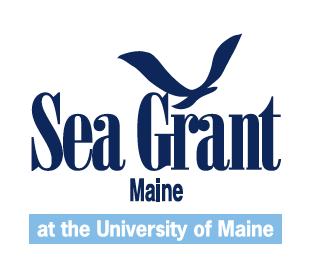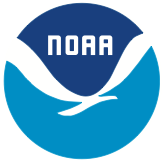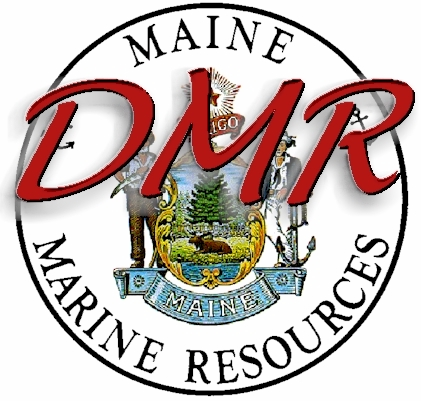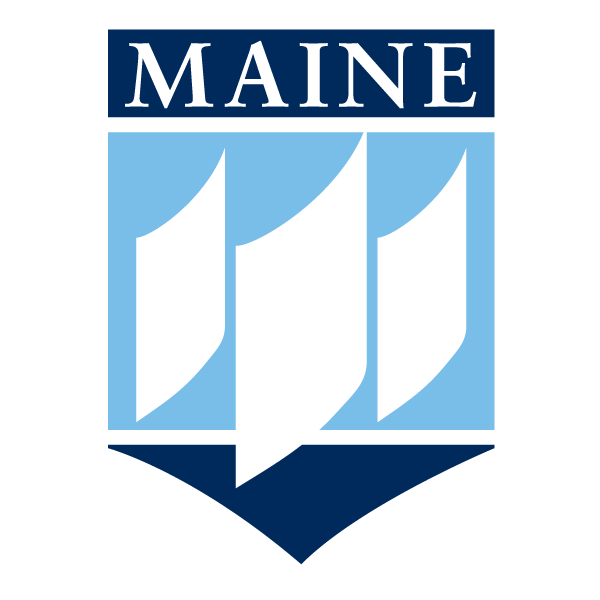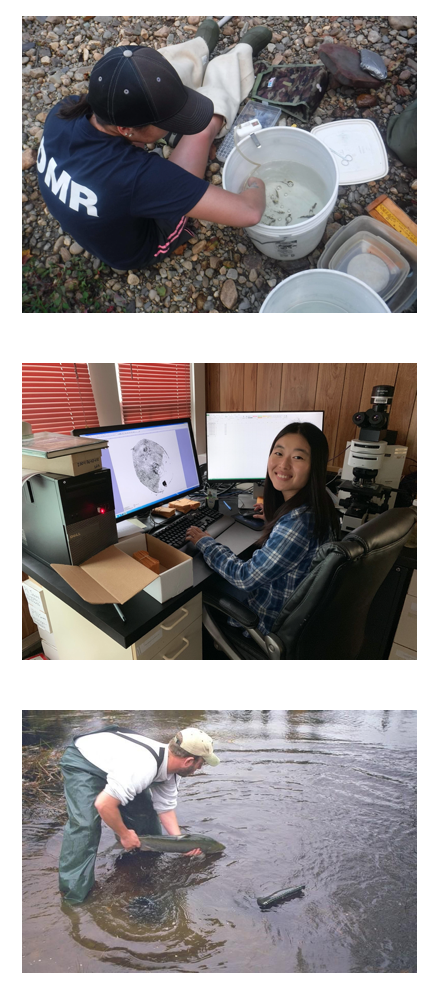Maine Sea Grant – NOAA Fisheries Undergraduate Internships in Sea-run Fish Research
Summer 2025 – Paid Internships
This opportunity is closed.
Maine Sea Grant is partnering with NOAA’s Northeast Fisheries Science Center (NEFSC) to provide opportunities for undergraduates to gain experience in the field of fisheries. We are currently recruiting interested students for participation in the Summer 2025 Undergraduate Internships in Diadromous Ecosystem Research Program.
Several Undergraduate Paid Internships are available (links below) through an ongoing collaboration between UMaine’s Sea Grant Program and NOAA’s Northeast Fisheries Science Center. These competitive positions will be 40 hours per week, based at one of several mentor locations in Maine including UMaine Orono and Maine Department of Marine Resources offices in Augusta and Jonesboro. Anticipated start date is May 12, 2025 with the positions running 12 weeks. Projects include:
Projects
Project Title: Diadromous Program at Maine Sea Grant (2 positions)
Project Location: Maine Sea Grant, University of Maine, Orono, ME
Project Leader: Justin.Stevens@maine.edu, 207-581-1434
Project Time Frame: May 2024 – August 2024 (flexible with student/mentor schedules)
Total Hours: up to 480
Semester Hour Allocation: 40 hours per week
Pay Rate: $18/hour
Maine Sea Grant is working on several collaborative projects involved with Atlantic Salmon research priorities.
The first position will help to develop models of juvenile Atlantic Salmon productivity that incorporate existing population datasets (juvenile density, stocking, redds) with physical, chemical, and thermal habitat features to: 1) describe the modern variability of juvenile Atlantic Salmon production within Maine, 2) evaluate parameters that correlate to the observed variation, and 3) develop a predictive model to estimate and summarize potential juvenile production throughout the Maine.
The second project involves multispecies approach to Atlantic Salmon recovery and involves fieldwork supporting hydroacoustic surveys in the Penobscot Estuary including data collection and processing.
The intern(s) would assist in:
- Literature reviews related to cold-water fish habitat requirements
- Field data collection
- Data entry, analysis and summation, and develop subject literature reviews for the project(s)
- Skills in GIS program and databases are preferred
Opportunities Include:
- Exposure to a wide range of fisheries topics related to ecosystem monitoring, climate variability and trophic ecology
- Developing essential laboratory and analytical skills
- Working independently with guidance from the Principal Investigators
- Maintaining detailed databases, conducting data QC/QA, providing the written/graphical summaries of the data
- Interaction with the larger University research community
Project Title: Atlantic Salmon Freshwater Assessments and Research of Mutual Interest to Maine DSRFH and NOAA
Project Location: Jonesboro office of the Maine Department of Marine Resources Bureau of Sea-run Fisheries and Habitat, 317 Whitneyville Road, Jonesboro, ME
Project Leader: Ernie Atkinson
Project Time Frame: May 2025 – August 2025 (flexible with student/mentor schedules)
Total Hours: up to 480
Pay Rate: $18/hour
Gulf of Maine Atlantic salmon are the last wild populations in the USA and are listed as endangered under the Endangered Species Act. Continued management-based research and assessments are necessary to document population responses to management action and habitat improvements and restoration.
ME-DMR Bureau of Sea-run Fisheries and Habitats have been in a cooperative agreement with NOAA-Fisheries for several years with the purpose of preserving Atlantic salmon within the Gulf of Maine. Under this agreement, ME-DMR staff conduct smolt trapping operations and operate adult salmon traps. MDMR also works with other partners on habitat connectivity and restoration projects. This intern would be exposed to a variety of fisheries techniques and management over the course of their term.
A clean driving record is a requirement as there may be a need to use a State of Maine vehicle for project needs.
The intern will assist MEDMR in trapping out migrating salmon smolts and trapping adult sea-run salmon on the Narraguagus River.
The intern will be involved in conducting habitat assessment surveys in the Narraguagus River, Maine. This work will involve conducting stream substrate sampling, water temperature monitoring, recording stream velocities, and other work focused on identifying key habitat variables that will be associated with ongoing habitat modeling efforts. Data entry and analysis will be part of this work as well as working with the site mentor to establish a survey plan.
They will then compile these data into a database for further analysis. Ideally, a summary report of the trends and observations for these surveys and data will be completed.
Along the way the intern will learn land navigation, database management and will be introduced to Program R as the analysis portion commences. The intern will work closely with the project leader to finish this work. The intern will also experience other aspects of Atlantic salmon management as noted below.
The region that this work will take place is sparsely populated providing a “wilderness” experience. Most of the field work takes place off paved roads in remote settings. Access to sites varies and may involve canoeing and hiking as well as driving on logging roads. Comfort working in remote locations is essential to success with this position.
The intern would assist in:
- Operation of rotary screw traps for the purpose of enumerating out-migrating Atlantic salmon smolts in the Narraguagus and East Machias Rivers.
- Operation of an adult trapping site on the Narraguagus River in Cherryfield, ME.
- Surveying habitat quantity and abundance in the Narraguagus River in the Downeast SHRU to be used later to enumerate rearing habitat for juvenile salmon.
- Assist in habitat connectivity and habitat restoration projects such as coarse wood additions and other habitat manipulations.
Opportunities Include:
- Getting to know and work with scientists from state and federal agencies.
- Exposure to fisheries science and enumeration techniques like smolt population estimate models.
- Exposure to stream habitat rehabilitation work and the reasons for doing this.
- The ability to apply database, GIS and statistical methods to a practical application while summarizing the water temperature data.
- Practical experience in fisheries techniques like stream monitoring, trap counts and habitat surveying.
- Further data exploration and summarization in a future capstone research project.
Project Title: Atlantic Salmon Freshwater Assessments and Research
Project Location: Milford office of the Maine Department of Marine Resources Division of Sea-run Fisheries and Habitat.
Project Leader: Jason.Valliere@maine.gov
Project Time Frame: May 2025 – August 2025 (flexible with student/mentor schedules)
Total Hours: up to 480
Pay Rate: $18/hour
Gulf of Maine Atlantic salmon are the last wild populations in the USA and are listed as endangered under the Endangered Species Act. Continued management-based research and assessments are necessary to document population responses to management action and habitat improvements and restoration.
ME-DMR Division of Sea-run Fisheries and Habitats have been in a cooperative agreement with NOAA-Fisheries for several years with the purpose of preserving Atlantic salmon within the Gulf of Maine. Under this agreement ME-DMR staff conduct a variety of activities associated with Atlantic salmon management and recovery.
The majority of this project is field work based out of the Milford Dam, in Milford Maine. The intern will assist MDMR Scientist with tasks associated with the daily operation of the Milford Dam fishway trap and sort facility, including enumeration of diadromous and resident fish species passing through the facility, collection of adult Atlantic salmon broodstock, and collection and stocking of adult river herring in high priority restoration lakes and ponds. The intern will learn fish species identification and proper fish handling techniques, be responsible for accurately recording data, and be expected to operate electronic fish counters and video equipment. The intern will also be responsible for preparing scale samples collected from Atlantic salmon and river herring for age analysis. A clean driving record is a requirement as there may be a need to use a State of Maine vehicle for project needs.
The intern would assist in:
- Assist with daily tending of the Milford trap and sorting facility.
- Preparation of Atlantic salmon and river herring scales for analysis.
- Experience with fish ID, fish handling, data recording, and sample processing.
- Assist with other field work as required. This may include juvenile river herring assessments and monitoring, fishway inspections, ect.
Opportunities Include:
- Getting to know and work with scientists from state and federal agencies.
- Exposure to fisheries science and enumeration techniques.
- Learn fish identification and proper handling techniques as this position will be working with endangered Atlantic salmon.
Project Title: Atlantic Salmon Freshwater Assessments and Research
Project Location: Augusta office of the Maine Department of Marine Resources Bureau of Sea-run Fisheries and Habitat
Project Leader: Jennifer Noll (jennifer.b.noll@maine.gov)
Project Time Frame: May 20254 – August 2025 (flexible with student/mentor schedules)
Total Hours: up to 480
Semester Hour Allocation: 40 hours per week as available
Pay Rate: $18/hour
Gulf of Maine Atlantic salmon are the last wild populations in the USA and are listed as endangered under the Endangered Species Act. Continued management-based research and assessments are necessary to document population responses to management action and habitat improvements and restoration.
ME-DMR Bureau of Sea-run Fisheries and Habitat (BSRFH) has been in a cooperative agreement with NOAA-Fisheries for several years with the purpose of preserving Atlantic salmon within the Gulf of Maine. Under this agreement, ME-DMR staff conducts a variety of activities associated with Atlantic salmon management and recovery. These activities include: adult salmon trap operations, juvenile assessments using electrofishing, spawner surveys and stream surveys for salmon habitat, stream restoration projects such as adding large wood to streams, and documenting temperature regimes of streams. ME-DMR staff also works with other diadromous species such as river herring, striped bass, American shad and rainbow smelt, collecting data and counts. This intern would be exposed to a variety of fisheries techniques and management over the course of their term. A clean driving record is a requirement as there may be a need to use a State of Maine vehicle for project needs.
The intern would assist in:
- Collection and preparation of biological samples and translocation of adult Atlantic salmon.
- Surveying habitat quantity & deploying temperature loggers.
- Annual juvenile salmon assessment work using electrofishing in the Kennebec River.
- Data entry into ME-DMR databases, inventorying and maintaining sampling equipment.
- Rapid stream assessment on the Sheepscot River.
- Developing educational materials
Opportunities Include:
- Connecting with scientists and professionals in the fisheries field.
- Exposure to and training in fisheries science and enumeration and assessment techniques such as electrofishing and habitat surveying.
- Learning the layout, functionality, and issues with multiple Atlantic salmon watersheds.
To be eligible for this program you MUST be enrolled or accepted in a degree-granting or certificate program from an accredited institution in Maine AND enrolled at least half time (6 credits or more) in the Fall 2025 semester.
If you are interested in applying for an internship please email the 3 things below to Justin Stevens and Ruth Haas-Castro:
- a cover letter describing your interest in this opportunity and your preferred (top 3) projects/locations.
- a resume (including names and contact information for 3 references)
- a copy of your most recent unofficial transcript(s)
The deadline for applications is noon (Eastern) Friday, February 28, 2025.
Please contact Justin Stevens with any questions.
